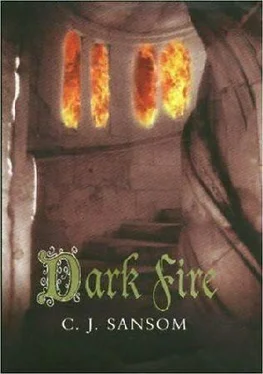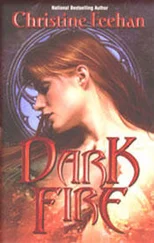C. Sansom - Dark Fire
Здесь есть возможность читать онлайн «C. Sansom - Dark Fire» весь текст электронной книги совершенно бесплатно (целиком полную версию без сокращений). В некоторых случаях можно слушать аудио, скачать через торрент в формате fb2 и присутствует краткое содержание. Жанр: Исторический детектив, на английском языке. Описание произведения, (предисловие) а так же отзывы посетителей доступны на портале библиотеки ЛибКат.
- Название:Dark Fire
- Автор:
- Жанр:
- Год:неизвестен
- ISBN:нет данных
- Рейтинг книги:5 / 5. Голосов: 1
-
Избранное:Добавить в избранное
- Отзывы:
-
Ваша оценка:
- 100
- 1
- 2
- 3
- 4
- 5
Dark Fire: краткое содержание, описание и аннотация
Предлагаем к чтению аннотацию, описание, краткое содержание или предисловие (зависит от того, что написал сам автор книги «Dark Fire»). Если вы не нашли необходимую информацию о книге — напишите в комментариях, мы постараемся отыскать её.
Dark Fire — читать онлайн бесплатно полную книгу (весь текст) целиком
Ниже представлен текст книги, разбитый по страницам. Система сохранения места последней прочитанной страницы, позволяет с удобством читать онлайн бесплатно книгу «Dark Fire», без необходимости каждый раз заново искать на чём Вы остановились. Поставьте закладку, и сможете в любой момент перейти на страницу, на которой закончили чтение.
Интервал:
Закладка:
'You think Elizabeth seemed like a martyr, then?'
Barak nodded. 'Ay, a martyr. That's the word.'
'But for what?'
He shrugged. 'Who can say? But you're right to talk to the family; I'll warrant the answer's there.'
The idea of Elizabeth's manner as martyrlike had not occurred to me, but it rang true. I looked again at Barak. Whatever else he was, he was no fool. 'I've sent Simon with a note asking Joseph to call here tomorrow at twelve.' I got up. 'We can go to the jetty first thing, we should start early. Where is it exactly?'
'Downriver, out beyond Deptford.'
'And now I should look at these papers of yours. Could you bring them to me?'
'Ay.' As he got up he nodded. 'You're getting to grips with the matter, I see. Planning everything out. My master said you were like that, didn't let go once you were started.'
THE SUN WAS BEGINNING to set as I took Barak's satchel out into the garden. I had had much work done there these last two years and often sat outside enjoying its calm and fine scents. Its design was simple; squares of flower beds divided by trellised paths shaded by climbing roses. No knot gardens with complex designs in the form of puzzles for me; there were puzzles in my work and my garden was a place of quiet order. Once I had thought reform might similarly order the world, but that hope was long gone. More recently I had hoped that the peace of my garden might be a foretaste of a quiet life away from London, but that too now seemed very far off. I sat on a bench, glad simply to be alone at last, and opened the satchel.
I sat reading for two hours as the sun sank gradually and the first moths appeared, flickering towards the candles Simon lit in the house. I turned first to the papers Michael Gristwood had brought from the monastery. There were four or five illustrated manuscripts written by old monastic writers, giving vivid descriptions of the use of Greek Fire. Sometimes they called it Flying Fire, sometimes the devil's tears, fire from the dragon's mouth, Dark Fire: I puzzled over that last name. How could fire be dark? An odd image came into my head of black flames rising from black coals. It was absurd.
There was a page in Greek torn from the biography of the Byzantine emperor Alexios I who reigned four hundred years ago.
Each of the Byzantine galleys was fitted in the prow with a tube ending with the head of a lion made of brass, and gilded, frightful to behold, through the open mouth of which it was arranged that fire should be projected by the soldiers through a flexible apparatus. The Pisans fled, having no previous experience of this device and wondering that fire, which usually burns upwards, could be so directed downward or towards either side according to the will of the engineer who discharges it.
I laid down the paper. What happened to the apparatus? I wondered. Had that been taken from Wolf's Lane too? If it was metal it would be heavy. Had the killers brought a cart there? I turned to another account, of a giant Arab fleet sent to invade Constantinople and utterly destroyed by flying fire in AD 678, fire that burned even on the very surface of the sea. I stared out over the lawn. Fire that burned downwards, that could burn on water itself? I knew nothing about the mysteries of alchemy, but surely such things were impossible?
I turned next to the only paper in the collection in English. It was written in a round, clumsy hand.
I, Alan St John, late soldier of the Emperor Constantine Palaiologos of Byzantium, do make this testament in the hospital of St Bartholomew's in Smithfield, this eleventh day of March 1454.
The year after Constantinople fell to the Turks, I remembered.
I am told I am like to die and have confessed my sins, for I followed the rough ways of a soldier of fortune all my life. The friars of this blessed place have treated and comforted me these last months since I returned from the fall of Constantinople sore wounded, which wounds grow infected again. The friars' care is proof of the love of God, and to them I leave my papers, that tell of the old secret of Greek Fire the Byzantines knew, that was passed down secretly from emperor to emperor and lost at last, together with the last barrel of distilled Greek Fire itself, that I brought back from the East. The secret was found by a librarian of Constantinople as he cleared the library to rescue the books from the approaching Turks, and he gave the papers and the barrel into my care before we fled the city in the ships the Venetians sent. I do not understand the Greek and Latin and meant to consult with alchemists in England, but then my illness disabled me. May God forgive me: I meant to make a profit from this thing, but no money can aid me now. The friars say it is God's will, for this is a terrible secret that could bring much ruin and bloodshed to unhappy humanity. It is no surprise they called the principal element in Greek Fire Dark Fire. I leave it all to the friars to do with as they will, for they are close to the Grace of God.
I put it down. So the friars had hidden the papers, and the barrel, away, realizing the potential for danger and destruction they had in their hands: not knowing that ninety years later King Henry and Cromwell would come and clear them all out. As I sat there, I had a vision of the fall of Constantinople, that great tragedy of our age; soldiers and officials and citizens fleeing the doomed city, making for the dock and the boats to Venice to the sound of booming artillery and the roars of the Turks outside.
I picked the paper up again, and sniffed it. It had a faint scent, pleasant and musky. I turned to the remaining papers, the same odour lingered on some of the others. I frowned; the smell was nothing like incense: surely it had not come from a monastery cellar. I had never smelt anything like it before. I laid the papers down again, then started as a moth flew into my face. The sun was touching the top of the trees over in Lincoln's Inn Fields, and cows were lowing in the distance. I turned to the books.
These were mostly Latin and Greek works that told stories of Greek Fire. I read old Athenian legends of magic garments that could burst into fire when worn, read Pliny's description of pools by the Euphrates that discharged inflammable mud. It was clear the writers were merely repeating stories, with no real idea of how Greek Fire was actually made. There were also a couple of alchemical works, which discussed the matter in terms of the philosopher's stone, the precepts of Hermes Trismegistus, and analogies between metals, stars and living things. Like the book I had taken from Sepultus's workshop, I found them incomprehensible.
I turned back finally to the old parchment Cromwell had shown me in his room, the picture of the ship spouting Greek Fire, with the top part torn off. I ran my fingers along the torn edge. That act had cost Michael Gristwood his life.
'Better the monks had destroyed everything,' I whispered aloud.
I heard footsteps and looked up to see Barak approaching. He glanced over the flower beds.
'This is a fine-smelling place.' He nodded at the documents surrounding me. 'Well,' he said, 'what d'you make of it all?'
'Not much. For all this great jangle of words no one seems to have any clue what Greek Fire really was. As for the alchemical works, they are incomprehensible riddles and obscure words.'
Barak grinned. 'I tried to read a law book once, it made me feel like that.'
'Guy may be able to make some sense of them.'
'That old black monk of yours? He's well known round where I lodge. By God, he's a strange-looking one.'
'He's a very knowledgeable man.'
'Ay, so they say round the Old Barge.'
'That is where you live?' I remembered those shutters closing.
'Ay, it's not a fine place like this but it's in the middle of London – useful as my business takes me all over the City.' He sat beside me and gave me a sharp look. 'You're to say as little as possible to the black monk, remember.'
Читать дальшеИнтервал:
Закладка:
Похожие книги на «Dark Fire»
Представляем Вашему вниманию похожие книги на «Dark Fire» списком для выбора. Мы отобрали схожую по названию и смыслу литературу в надежде предоставить читателям больше вариантов отыскать новые, интересные, ещё непрочитанные произведения.
Обсуждение, отзывы о книге «Dark Fire» и просто собственные мнения читателей. Оставьте ваши комментарии, напишите, что Вы думаете о произведении, его смысле или главных героях. Укажите что конкретно понравилось, а что нет, и почему Вы так считаете.












